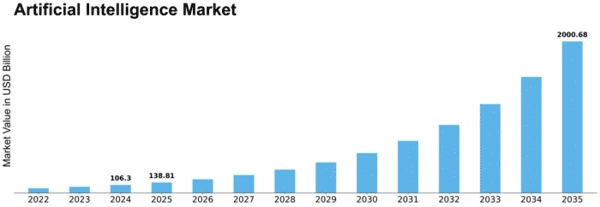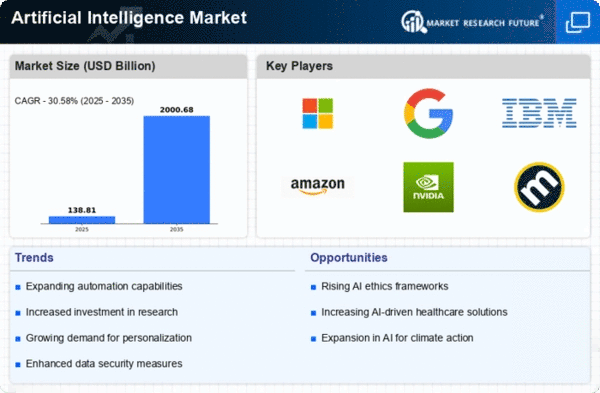Rising Demand for AI Solutions
The Artificial Intelligence Market is experiencing a notable surge in demand for AI solutions across various sectors. Industries such as healthcare, finance, and manufacturing are increasingly adopting AI technologies to enhance operational efficiency and decision-making processes. According to recent data, the AI market is projected to reach a valuation of approximately 500 billion USD by 2028, driven by the need for automation and data-driven insights. This rising demand is indicative of a broader trend where organizations are recognizing the potential of AI to transform their business models and improve customer experiences. As companies strive to remain competitive, the integration of AI solutions is becoming a strategic imperative, thereby propelling the growth of the Artificial Intelligence Market.
Increased Investment in AI Startups
Investment in AI startups is a critical driver of growth within the Artificial Intelligence Market. Venture capital funding for AI-related ventures has surged, with billions of dollars being allocated to innovative companies developing cutting-edge AI technologies. This influx of capital is fostering a vibrant ecosystem of startups that are pushing the boundaries of what AI can achieve. In 2025, investments in AI startups reached an estimated 40 billion USD, highlighting the confidence investors have in the potential of AI to disrupt traditional industries. As these startups continue to innovate and bring new solutions to market, they are likely to play a pivotal role in shaping the future landscape of the Artificial Intelligence Market.
Growing Need for Data Security and Privacy
The increasing focus on data security and privacy is emerging as a significant driver in the Artificial Intelligence Market. As organizations adopt AI technologies, they are also confronted with the challenges of safeguarding sensitive information and ensuring compliance with regulations. The demand for AI-driven security solutions is on the rise, as businesses seek to protect their data from cyber threats and breaches. In 2026, the market for AI in cybersecurity is projected to reach approximately 30 billion USD, reflecting the urgent need for advanced security measures. This growing emphasis on data protection not only influences the adoption of AI technologies but also shapes the development of new solutions within the Artificial Intelligence Market.
Advancements in Machine Learning Algorithms
The Artificial Intelligence Market is significantly influenced by advancements in machine learning algorithms. These innovations are enabling more sophisticated data analysis and predictive modeling, which are essential for various applications, including natural language processing and computer vision. The development of deep learning techniques has particularly revolutionized the capabilities of AI systems, allowing for more accurate and efficient processing of large datasets. As organizations increasingly rely on data-driven strategies, the demand for advanced machine learning solutions is expected to rise. This trend is reflected in the projected growth of the AI software market, which is anticipated to exceed 200 billion USD by 2026. Such advancements not only enhance the functionality of AI applications but also contribute to the overall expansion of the Artificial Intelligence Market.
Expansion of AI Applications in Various Sectors
The expansion of AI applications across diverse sectors is a prominent driver of growth in the Artificial Intelligence Market. Industries such as retail, transportation, and agriculture are increasingly leveraging AI technologies to optimize operations and enhance customer engagement. For instance, AI-powered chatbots are transforming customer service in retail, while predictive analytics is improving supply chain management in logistics. The versatility of AI applications is evident, as they can be tailored to meet the specific needs of different industries. This adaptability is expected to contribute to a compound annual growth rate of over 30 percent in the AI market through 2026. As more sectors recognize the benefits of AI, the demand for innovative solutions will likely continue to escalate, further propelling the Artificial Intelligence Market.




















Leave a Comment